St. Laurent Selektion 2019
QWt Niederösterreich, Schloss Gobelsburg, 750 ml

| Grape variety: | Sankt Laurent |
| Producer: | Weingut Schloss Gobelsburg |
| Origin: | Austria / Niederösterreich / Kamptal |
Description
The St. Laurent has a wealth of tannins. Its firmly joined body is powerful and muscular and will therefore be the right choice for beef and game dishes. Intense aromas of blackberries, amarena cherries, plums and gingerbread spices dominate its flavour with roasted aromas from the wood development as well as mineral accents reminiscent of graphite and charcoal. A complex wine with a long finish and several years of ageing potential.
Attributes
| Origin: | Austria / Niederösterreich / Kamptal |
| Grape variety: | Sankt Laurent |
| Label: | Vegan |
| Ripening potential: | 3 to 10 years |
| Drinking temperature: | 16 to 18 °C |
| Food Pairing: | Latin American dishes, Spiced grillades, Châteaubriand, Filet Wellington, Wild boar entrecôte with Spätzli, Hearty stew with pulses |
| Vinification: | fully destemmed, fermentation in wooden barrel |
| Harvest: | hand-picking, strict selection, in small boxes |
| Maturation: | in tonneau |
| Volume: | 12.5 % |
| Note: | Contains sulphites |
Sankt Laurent
The grape with the halo
The berries of the Saint Laurent fade from the tenth of August, St. Lawrence’s day, the patron saint of chefs. In its homeland in Austria, the variety was formerly called Laurenzitraube. With its aroma of fresh sour cherries and elegant tannins, it appears to be a more powerful version of Pinot noir. However, the two are not related. The Saint Laurent is currently undergoing a boom. Its wines are deep-red, velvety, full-bodied and aromatic. Above all, the qualities from the oak barrels delight lovers of softer, fuller reds. Yet the largest cultivation area is not in Austria, but the Czech Republic. A little anecdote: the Saint Laurent lost its halo there during the Soviet era, and was allowed only to be called Vavrinecké instead of Svatovavrinecké.

Kamptal
Kamptal: a dynamic atmosphere north of the Danube
With an ever-growing number of leading vintners, Kamptal has increasingly stood out in recent years from the shadow of the legendary Wachau region. The basis for this are the various terroirs in this broad-ranging valley. At Loisium, the region is also host to a spectacular, futuristic visitor center.

Niederösterreich
Lower Austria: crus near and far from the Danube
Austria's largest state is also its largest wine region. 46,000 hectares are planted with vines in Lower Austria. It is a heterogenic wine region, consisting of eight wine growing areas. While white varieties like Grüner Veltliner and Riesling dominate in the areas north and west of Vienna, red varieties set the tone in the south and in the southeast (Thermenregion and Carnuntum). The internationally famous white crus from Grüner Veltliner and Riesling develop in the picturesque Wachau and Kamptal.

Austria
Austria – Sumptuous culture, accessible to all
Austria is characterized by unbelievable topographical diversity. A flat steppe in the east, forests and hills in the Alpine regions, wetlands and Mediterranean landscapes in the south. This in addition to a rich tradition and even greater love. It’s no surprise that the Romans found joy on this patch of Earth and cultivated wine growing. Austrian wine is not abundant, but it is high quality.



